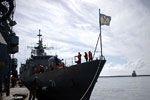 Reuters: A second visit by Iranian warships to Sudan in little over a month risks widening divisions inside the African country’s government and upsetting its Gulf Arab donors. By Ulf Laessing
Reuters: A second visit by Iranian warships to Sudan in little over a month risks widening divisions inside the African country’s government and upsetting its Gulf Arab donors. By Ulf Laessing
 PORT SUDAN (Reuters) – A second visit by Iranian warships to Sudan in little over a month risks widening divisions inside the African country’s government and upsetting its Gulf Arab donors.
PORT SUDAN (Reuters) – A second visit by Iranian warships to Sudan in little over a month risks widening divisions inside the African country’s government and upsetting its Gulf Arab donors.
Two Iranian navy ships also visited in October, days after Sudan accused Israel of bombing a weapons factory in the capital Khartoum. Israel declined to comment on the alleged attack but has accused Sudan of smuggling weapons to the Gaza Strip, which is ruled by the Iranian-allied Palestinian movement Hamas.
Sudanese officials described the docking of Iran’s 23th fleet – destroyer Jamaran and logistics ship Bushehr – for three days in Port Sudan on Saturday as a routine refueling stop.
“The port has seen similar visits from ships from America, Europe and the rest of the world,” army spokesman al-Sawarmi Khalid told reporters late on Friday.
Iran’s Press TV said fleet commanders met with Sudanese government and navy officials. It quoted Abdulla al-Matri, head of the Sudanese navy in Port Sudan, as saying he “expressed happiness over the arrival…and called for the further expansion of the military ties between Iran and Sudan,” according to a report on the station’s website.
Analysts say the docking of ships, which will be open to the public, according to the army, could hinder Sudan’s efforts to win badly needed aid from Gulf Arab oil producers such as Saudi Arabia, which are worried about Iran’s influence in the region.
Sudan’s President Omar Hassan al-Bashir has held on to power for 23 years, but economic crisis has fed dissent and squeezed the patronage system that secures loyalty of key army and ruling party figures. Last month, authorities arrested a former spy chief and 12 others accused of a coup attempt.
Faced with the loss of three quarters of oil production when South Sudan broke away to become independent last year, Sudan’s foreign ministry has sought to bolster links with Gulf states.
But military ties with Shi’ite Iran unnerve Sunni Muslim Saudi Arabia, located just across the Red Sea from Port Sudan.
“Sudan needs to understand that this visit will not be accepted by Saudi Arabia,” said Khalid al-Dakhil, a Saudi political analyst.
The kingdom has not publicly commented on the visits but pro-government paper al-Riyadh said Sudan was risking Gulf ties.
“Sudan is in a state of losing balance as it loses Arab friendship, especially of Gulf Arab states, who know the precise details of its alliance with Iran, politically and militarily,” the daily wrote in an editorial titled “The masks fall between Sudan and Iran”.
CONTROVERSIAL TIES
Bashir and Iran’s President Mahmoud Ahmadinejad have met several times in the past two years but the bilateral ties are controversial inside the Khartoum government.
Analysts say the army, facing several insurgencies in Sudan’s borderlands, wants to foster ties with Iran after both countries signed a military agreement in 2008.
“Iran is one of the few countries apart from China which would probably sell Sudan weapons,” said Magdi El Gizouli, a fellow at the Rift Valley Institute.
But the foreign ministry sees the Iranian connection as an obstacle to winning more investment from Gulf states and also Europe, as it tries to overcome Sudan’s isolation and image as radical Islamist state, diplomats say.
Foreign Minister Ali Ahmed Karti played down the ship visit. “This is normal cooperation between armies,” he said on Tuesday.
But in a television interview, reported by online Paris-based Sudan Tribune, Karti said in November he had not been consulted over the first navy visit after opposing a similar docking in February.
“You have here a conflict of moderate forces who want to break the isolation and hardliners in the army who don’t care about the West. They think wooing the West is a lost cause so they focus on Iran and Hamas,” one Western diplomat said.
Iran and Sudan have little bilateral trade. Iran is hardly noticed in Khartoum beyond a bridge project it funds, a cultural centre teaching Farsi and an office of its state oil company.
Gulf states are among the biggest investors in the country and have just funded a large sugar plant and Sudan’s only shopping mall. Diplomats say Sudan’s central bank has toured the Gulf several times, trying to drum up support for more funding.
(Additional reporting by Yeganeh Torbati in Dubai and Khalid Abdelaziz; Editing by Mark Trevelyan and Jason Webb)


